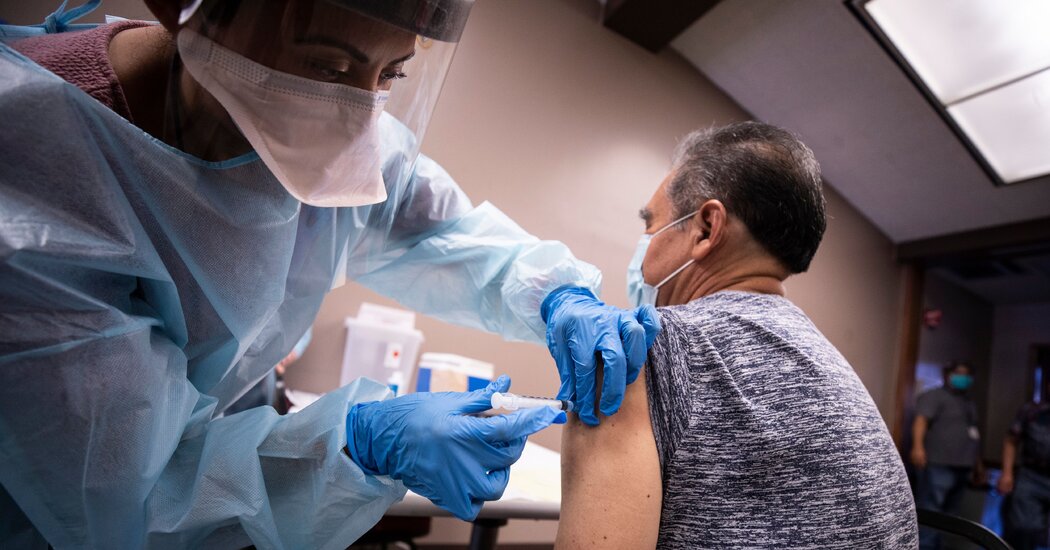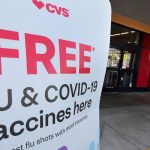To prevent a repeat of last winter’s “tripledemic” of respiratory illnesses, Americans will be encouraged to roll up their sleeves not just for flu shots but for two other vaccines, one of them entirely new.
Federal health officials have already asked manufacturers to produce reformulated Covid vaccines to be distributed later this year. Recently, the Centers for Disease Control and Prevention took an additional step, endorsing two new vaccines against respiratory syncytial virus for older Americans.
The three shots — flu, Covid and R.S.V. — may help to reduce hospitalizations and deaths later this year. But there are uncertainties about how the vaccines are best administered, who is most likely to benefit, and what the risks may be.
For older and immunocompromised Americans, all three vaccines are a “godsend,” said Dr. Ofer Levy, director of the precision vaccines program at Boston Children’s Hospital and an adviser to the Food and Drug Administration.
“The number of elders who die of viral infection every winter in our intensive care units, and also sometimes in the summer, is large — it’s in the tens of thousands of individuals,” Dr. Levy said. “Each of these vaccines is a huge win.”
Yet it’s unclear how many Americans will opt for the shots. Some 71 percent of adults ages 65 and older got a flu shot this past winter, but only about 43 percent chose to get the Covid booster.
The misery of the past winter may help change minds. The flu may have led to as many as 58,000 deaths, peaking in December, according to the C.D.C. Covid claimed roughly 50,000 lives between November and March.
R.S.V. kills up to 10,000 people each year, most of them older. Infections this year peaked in November and resulted in about twice as many hospitalizations, including children, as in prepandemic years.
Only the Covid and flu vaccines were available last fall. The R.S.V. vaccines for adults are new, and in clinical trials proved to be highly effective against infection of the lower respiratory tract, which includes the lungs.
In May, the F.D.A. approved the first two versions, made by Pfizer and GSK, for older adults. The C.D.C.’s advisers recommend that Americans age 60 and older get the shot in consultation with their doctors. (The Pfizer vaccine is also being evaluated for use in pregnant women as a way to protect newborn infants.)
Bundling all three inoculations into a single visit to a clinic or pharmacy is likely to encourage more people to get immunized, Dr. Levy said. “Plus, you want to get these shots in arms before the viral respiratory season in the winter,” he added.
But other scientists hesitated to endorse the idea, citing the paucity of data on safety and effectiveness when all three are given at the same time.
Sometimes, vaccines work against one another when administered simultaneously. According to data presented to the C.D.C.’s advisers, the R.S.V. and flu vaccines produced lower levels of antibodies when given at the same time than when either was given alone.
“I would say, when possible, it might be good to spread them out,” said Dr. Camille Kotton, a physician at Massachusetts General Hospital and a member of the C.D.C. scientific advisory panel.
“I remain clinically concerned, especially where influenza vaccine doesn’t engender as much protection as we might like,” she said.
The vast majority of people at risk for illness and death following infections with these viruses are those 75 and older. In that group, the benefit from each of the vaccines clearly outweighs any safety concerns, Dr. Kotton and other experts said.
Up to 85 percent of flu-related deaths in recent years were among those age 65 and older, according to the C.D.C. The agency recommends that older adults get a high-dose flu vaccine or one with an adjuvant, an ingredient that can produce a stronger immune response.
Hospitalizations and deaths from Covid also occur primarily in the oldest Americans, and Covid boosters are now thought to be beneficial primarily for older adults and people with weakened immune systems.
In June, the F.D.A. advised Pfizer-BioNTech, Moderna and Novavax to manufacture Covid shots designed to target XBB.1.5, the Omicron variant that accounts for roughly 27 percent of cases. That variant seems to be receding, however, and a newer variant, XBB.1.16, is on the upswing.
R.S.V. is the leading cause of infant hospitalizations in the United States, and among the top killers of young children in low- and middle-income countries. The virus was underappreciated as a respiratory threat to adults until recently.
The virus may lead to as many as 160,000 hospitalizations and 10,000 deaths among older adults each year, according to the C.D.C. — and those numbers are likely to be underestimates. For every one million adults age 65 and older who get the vaccine, 25,000 outpatient visits, 2,500 hospitalizations and 130 deaths would be prevented, according to one analysis presented to the agency’s advisers.
For decades, vaccines against R.S.V. proved challenging to design. A breakthrough in 2013 galvanized efforts by several companies. In a recent trial, the GSK vaccine, to be sold as Arexvy, retained much of its potency into the second year, and its efficacy is being studied for an even longer period.
Pfizer is still evaluating the durability of its vaccine, which will be marketed as Abrysvo. If the vaccines remain effective over a long time, an R.S.V. shot may be not be needed every year.
The companies’ trials did not enroll enough people who were immunocompromised, medically frail, live in long-term care facilities, or were 75 and older to gauge efficacy in those groups. These are also the Americans most vulnerable to R.S.V.
Although flu and other vaccines carry a small risk of the autoimmune disease Guillain-Barré syndrome, those numbers generally are on the order of one or two cases per million. Evaluating the new R.S.V. vaccines, the manufacturers each reported three neurological cases, including Guillain-Barré syndrome, within 42 days of vaccination in a population of about 40,000 people.
Still, the trials were not large enough to determine whether those cases occurred by chance or were caused by the vaccines. “That information really can’t be obtained until post licensure and post recommendation and rollout,” said Dr. Helen Chu, a physician and immunologist at the University of Washington.
Influenza, Covid and R.S.V. infections themselves pose a risk of Guillain-Barré syndrome and other neurological problems, so the risk-benefit balance still heavily favors vaccination, Dr. Chu said.
Still, the reports of adverse events related to the R.S.V. vaccines made some C.D.C. advisers reluctant to back them for people who do not face high risks from the infection.
That’s partly why the scientific panel said that anyone age 60 and older “may” opt to get the vaccine in consultation with a doctor, instead of issuing a blanket recommendation for all adults over 60 or even 65.
That decision risks deepening racial inequities regarding vaccination, some experts said. Many people of color, often at disproportionate risk of severe illness or death, do not have easy access to a health care provider who might help them weigh the risks and benefits of R.S.V. vaccination.
The recommendation also places the onus on general physicians and other health care providers to weigh the risks and benefits, Dr. Chu noted.
“It’s hard for the committee,” she said, referring to the C.D.C.’s expert panel. “It’s certainly going to be much, much harder for a G.P.”
The C.D.C.’s recommendations ensure that most Americans will not have to pay out of pocket for the vaccines. This fall marks the first time that the distribution of Covid vaccines will not be managed by the federal government, but insurance companies will continue to cover the costs.
How much Pfizer and GSK will charge for the new R.S.V. vaccines is still unclear. Pfizer said the price of its vaccine was still being negotiated, but might fall between $180 and $270.
GSK doubled its initial price of $148 two weeks before the C.D.C. advisers were scheduled to meet, giving the agency staff little time to redo its cost-effectiveness analysis, according to one C.D.C. scientist with knowledge of the matter. GSK now has settled on a range of $200 to $295.
GSK raised its price because of the new data showing effectiveness into a second season, said Alison Hunt, a spokeswoman for the company.
Ongoing research is likely to provide more information on the new R.S.V. vaccines. In preliminary data, a second dose of the GSK vaccine did not boost antibody levels, which puzzled the science advisers at last week’s meeting.
Pfizer is investigating whether a second dose of its vaccine, given one year after the first, will boost immunity. Those results are expected some time early next year. The companies are also studying whether people who are immunocompromised should get a single dose or two doses given one month apart.
“We never have all the information we want,” said Dr. Levy, the F.D.A. adviser.
“But one thing we know for sure is that every winter people lose loved ones, grandmothers, grandfathers to the viruses, and now we have better tools. And we want to deploy them.”




